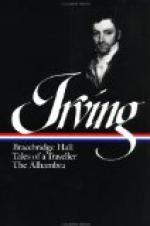When the bank opened for business on the Tuesday following the failure, there was a stampede of frightened depositors. Before eleven o’clock the run had assumed ugly proportions and no amount of argument could stay the onslaught. Colonel Drew and the directors, at first mildly distressed, and then seeing that the affair had become serious, grew more alarmed than they could afford to let the public see. The loans of all the banks were unusually large. Incipient runs on some had put all of them in an attitude of caution, and there was a natural reluctance to expose their own interests to jeopardy by coming to the relief of the Bank of Manhattan Island.
Monty Brewster had something like $200,000 in Colonel Drew’s bank. He would not have regretted on his own account the collapse of this institution, but he realized what it meant to the hundreds of other depositors, and for the first time he appreciated what his money could accomplish. Thinking that his presence might give confidence to the other depositors and stop the run he went over to the bank with Harrison and Bragdon. The tellers were handing out thousands of dollars to the eager depositors. His friends advised him strongly to withdraw before it was too late, but Monty was obdurate. They set it down to his desire to help Barbara’s father and admired his nerve.
“I understand, Monty,” said Bragdon, and both he and Harrison went among the people carelessly asking one another if Brewster had come to withdraw his money. “No, he has over $200,000, and he’s going to leave it,” the other would say.
Each excited group was visited in turn by the two men, but their assurance seemed to accomplish but little. These men and women were there to save their fortunes; the situation was desperate.
Colonel Drew, outwardly calm and serene, but inwardly perturbed, finally saw Brewster and his companions. He sent a messenger over with the request that Monty come to the president’s private office at once.
“He wants to help you to save your money,” cried Bragdon in low tones. “That shows it’s all up.”
“Get out every dollar of it, Monty, and don’t waste a minute. It’s a smash as sure as fate,” urged Harrison, a feverish expression in his eyes.
Brewster was admitted to the Colonel’s private office. Drew was alone and was pacing the floor like a caged animal.
“Sit down, Brewster, and don’t mind if I seem nervous. Of course we can hold out, but it is terrible—terrible. They think we are trying to rob them. They’re mad—utterly mad.”
“I never saw anything like it, Colonel. Are you sure you can meet all the demands?” asked Brewster, thoroughly excited. The Colonel’s face was white and he chewed his cigar nervously.
“We can hold out unless some of our heaviest depositors get the fever and swoop down upon us. I appreciate your feelings in an affair of this kind, coming so swiftly upon the heels of the other, but I want to give you my personal assurance that the money you have here is safe. I called you in to impress you with the security of the bank. You ought to know the truth, however, and I will tell you in confidence that another check like Austin’s, which we paid a few minutes ago, would cause us serious, though temporary, embarrassment.”




